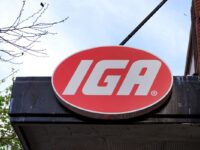
Ritchies IGA is celebrating its 150th anniversary with the $5 million revamp of its store in well-heeled Mosman in Sydney, catering to the discerning foodie with high-end product lines and ranges from start-up suppliers in the community.
From freshly baked breads and organic fruit and vegetables to gourmet condiments and bottles of $78 truffle oil, the focus of the Mosman store is on showcasing premium products, especially in the deli and bakery sections, CEO Fred Harrison told Inside Retail.
“This is a very strong demographic. People are foodies here, but you have to be competitive, you can’t insult price. People appreciate when you range products that aren’t easily found in Woolies and Coles. That point of difference is our bread and butter,” he said.
“We have to be outstanding. If we were going to be a mini-me and copy Woolies and Coles, we’d go bust. [Defunct supermarkets] Jewel and Franklin did that so we need to go in a totally different direction and we’re working on activations. It’s about being a foodie’s paradise.”
According to Harrison, there are plans to roll out similar stores this year. Currently there are 78 Ritchies supermarkets on the east coast of Australia. Interestingly, the next store to open is on the former site of the infamous Pentridge Gaol in Victoria, where murderers Chopper Reid and Ronald Ryan – the last man who was hung in Australia – were imprisoned.
“This store cost close to $5 million. We’re a private company and we need to be sensible. We don’t have unlimited money and if we invest in the money, it’s important we see an increase in sales. We have 10 Fine Food and Wine stores and we intend to roll around three or four of these a year,” he explained.
The Spit Junction store is the seventh Ritchies Fine Food and Wine store to roll out nationally.
“It takes a lot of manpower and planning [to open these stores] and being a smaller private company, we don’t just cookie cutter it, because you need to produce for the local area as well.”
A big focus at IGA is giving small community suppliers, which they source from at weekend markets, the opportunity to sell their products in their stores. Unfortunately, some of their local suppliers, particularly those in the Gippsland region and breweries in Northern Victoria have been affected by the bushfires and the retailer is running special promotions to help stimulate sales.
“The impact of these fires is going to be felt for a year or two, even though they’ve slowed down, doesn’t mean the problem has been solved,” said Harrison.
Decades of building up these close relationships with suppliers will benefit Harrison as he embarks on a new venture as a board member of Co-Operative Supermarkets Australia. The new group of independent supermarkets and convenience stores is expected to use its industry experience and contacts to collectively bargain with suppliers and could spell trouble for IGA owner Metcash.
Saying goodbye to Kaufland
While Harrison acknowledges that there is intense competition in the supermarket sector, he “makes no secret” of the fact that he’s pleased to see that Kaufland has exited the Australian market. When the German supermarket giant approached the planning minister in Victoria for exemption of the approval process, Harrison admits that he “saw red” and described the process as “un-Australian”.
“So for them to pack up and walk away is somewhat of a surprise, none of us saw it coming, but I think they realised the Australian market is a fair bit tougher than what their initial research showed,” Harrison observed.
“They were probably in the process of discovering our building costs in Australia are significantly higher per square metre than any other country in the world when they looked at their numbers. They were struggling in Europe and the US hadn’t gone well, so the right decision was to pull out. Your first loss is the best loss. I think they came to the realisation that it would be another 10 to 12 years before they turned a profit, so why bother? I think common sense prevailed.”















